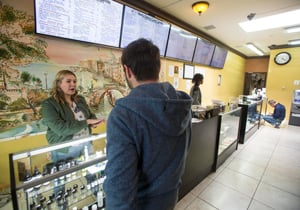
The November state ballot initiative that would legalize adult recreational cannabis use is overshadowing a fierce battle in Los Angeles over who will be allowed to cash in on the burgeoning industry.
The fight revolves around a mandatory local licensing system that must be put into place in order for marijuana businesses to comply with state regulations set to go into effect on Jan. 1, 2018, as part of 2015’s Medical Marijuana Regulation and Safety Act. Without the local permits, cannabis storefronts, grow operations, product manufacturers, and any other marijuana-related businesses would become illegal.
“If no action is taken, there will be no legal marijuana activity in Los Angeles,” said Jerred Kiloh, president of the United Cannabis Business Alliance Trade Association and owner of the Higher Path dispensary in Sherman Oaks.
While medical marijuana operations are the only legal ones under state law at this time, the regulations would likely expand to include all marijuana business should Proposition 64 pass on Nov. 8.
The urgency to create a licensing system in Los Angeles has been heightened following Gov. Jerry Brown’s veto of a stopgap measure on Sept. 30. Assembly Bill 2385 would have allowed the city’s current regulatory scheme, established by Proposition D, to count as a licensing program, but Brown said the bill was “inconsistent” with state regulations.
While Proposition D gave tacit approval to as many as 135 pot shops that were compliant with an earlier city ordinance, those businesses were not given a license, something that would be required under the forthcoming rules in order for the businesses to operate without interference.
While the governor’s veto has galvanized Los Angeles cannabis businesses and lawmakers to create a local permitting system, stakeholders are bickering about how that system should be set up. Established medical marijuana shop owners claim they should receive special consideration for permits, while new players and those operating outside of the city’s existing legal structure argue a more laissez faire licensing system should be put in place.
Kiloh, speaking on behalf of the more established players represented by the business association, said the good citizenship and work undertaken by those entities in their dealings with the city over the past several years should count for something. In a measure submitted to the City Council for feedback, the group set forth a flexible system that would give lawmakers broad power to regulate the number of businesses that can operate in Los Angeles so long as the number does not drop below the 135 established by Proposition D.
“Because of the back and forth over the last few years, we felt shops that have followed the rules should have some priority,” said Kiloh. “But we’ve tried to make sure we’ve included all stakeholders.”
Michael Chernis, the policy director for Los Angeles Cannabis Task Force, a group that advocates for a more comprehensive and broad-based licensing system, said the association’s measure is flawed.
“It doesn’t preclude new players from participating in the market, but it also doesn’t affirmatively guarantee any new participation either,” Chernis said. “Hopefully it falls by the wayside.”
